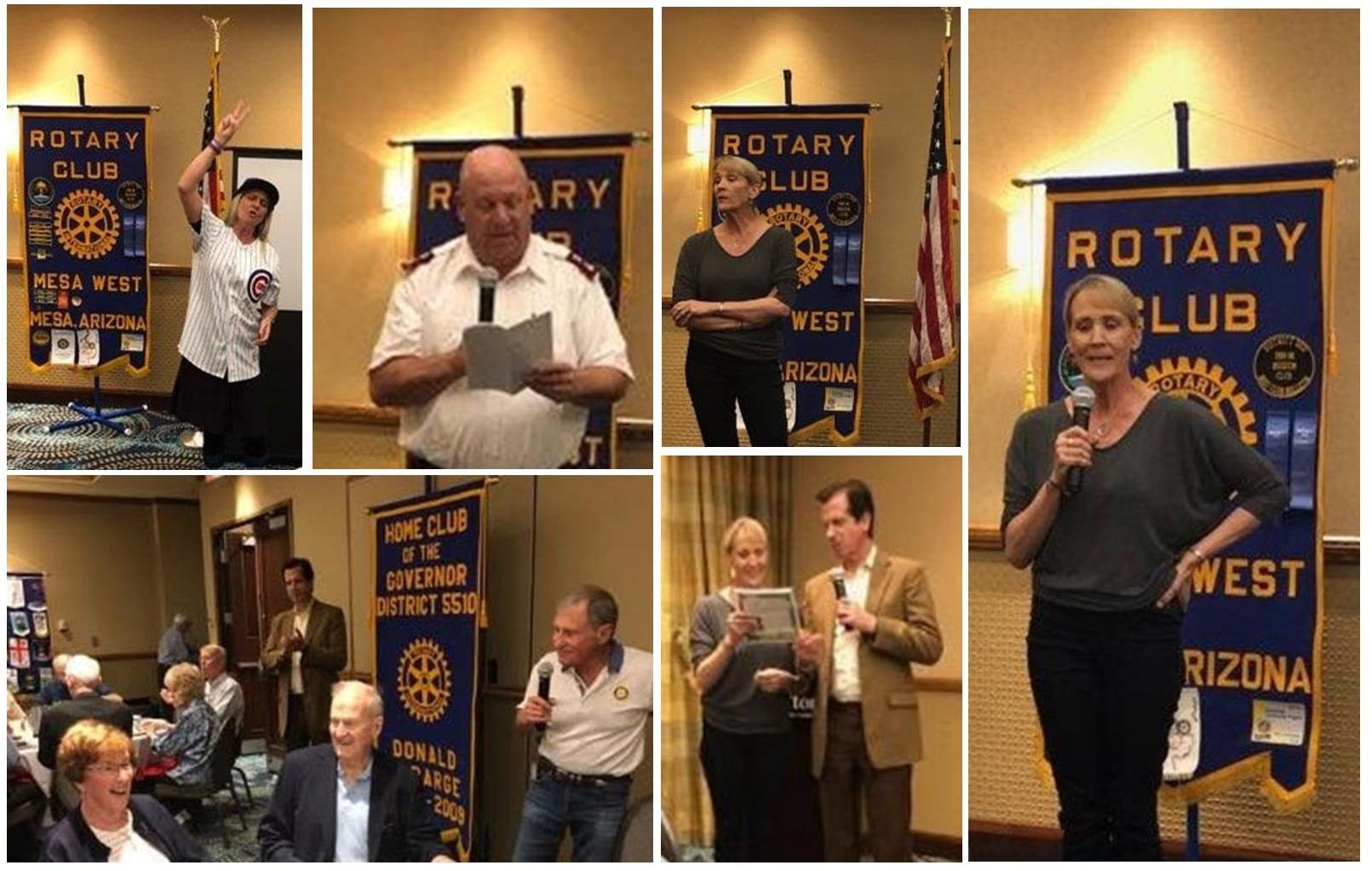 President Jim Schmidt opened the meeting by asking Daryl Bethea to offer the invocation and Warren Williamson to lead the Pledge of Allegiance. Chris Krueger was dressed for the occasion of leading members and guests in singing Take Me Out to the Ballgame.
President Jim Schmidt opened the meeting by asking Daryl Bethea to offer the invocation and Warren Williamson to lead the Pledge of Allegiance. Chris Krueger was dressed for the occasion of leading members and guests in singing Take Me Out to the Ballgame.Guests
Scott Ramsey with the Salvation Army was introduced as a guest. Chuck Flint was honored to introduce former member Fred Scott and his wife Billie who were visiting from Salmon Arm, Canada. Polly Cady introduced Don Seitz from Concord, North Carolina who exchanged flags with President Jim.
Drawings
Don Seitz drew three tokens for the attendance drawing. It would have paid Steve West, Kevin Gustafson, or Brian Harvey to attend Rotary, but since they were not there to win $5 it will roll over and the potential prize for attending Rotary on March 12 will be $10. Fred Scott drew Ron Thompson's ticket in the weekly raffle, but since Ron did not draw the Ace of Clubs, the $1,131 prize he was trying to win will be even bigger on March 12.
Happy Bucks
Allan Cady was very happy. At the March 5 meeting, Andrea Murphy, the Interact Advisor at Westwood High School, told about Sleep in Heavenly Peace, a project where volunteers provide hands-on effort to build beds for children who would otherwise sleep on the floor. Following her brief presentation, Allan asked for other Rotarians to add to the $100 he was going to contribute to the effort. He was happy to announce that $310 had been raised and he was going to ask the club to increase the overall amount to $600. He suggested that other Rotarians could let Jeanie know if they want to be billed for a pledge to the project. Dan Coons was happy to be going to PETS. Pam Cohen pledged $100 toward her Paul Harris Fellow recognition as she was so happy to see Fred and Billie at the meeting. Ray Smith was happy as an accountant that they were halfway to April 15. He was also happy to see Jim Crutcher at the meeting. Penny May was happy to announce that Hans and Lolita Wiesner were finally getting to go home. For the benefit of those who might not be aware, she explained that they had been on the Diamond Princess cruise ship which was anchored outside Yokohama. They were quarantined in an inside cabin for fourteen days. They did get to go out on the deck for a walk wearing masks twice a day. After two weeks quarantined on the ship, they left in hazmat suits to be transported by bus to a chartered plane to fly them to Ontario where they were quarantined an additional two weeks. In their new situation, they had windows, but were looking at snow . Penny May said that sales of Corona Beer have suffered, and they are thinking of changing their name to Ebola. Bob Zarling was happy to tell of young friends of his - a couple in Tel Aviv, Pat and Shelly Gallahan who were happy to have a piece crafted by Jack Rosenberg. John Pennypacker explained how to avoid the Corona Virus. He said you need to wash your hands like you'd been cutting up hot peppers and had to get all the residue off your hands before you could take your contacts out. He had learned in the March 1 Mesa Tribune that Waste Management and United Fibers both canceled contracts with the City of Mesa for recycling citing declining demand. United Fiber submitted a "non-negotiable" processing fee increase of $95,000. Mesa City Council voted on the increase at their March 3 meeting, but John had not been able to learn how they voted. United Fibers increased their processing fee from $75 to $82 and reduced the contamination allowed from 10% to 0%. The city estimated its contamination closer to 20%. Recycling used to be a cash cow for most municipalities. Mesa now pays more than $1million a year to recycle versus simply using the landfill. Phoenix recently increased its collection fee by 25%. Joan Reimann was happy to have received a good report from her doctor and does not have to go back until October. Dick Myren contributed his traditional Happy to be a Member of Mesa West honoring Rod Daniels. He contributed more happy bucks because the last four meals at our meeting venue had been superb. Greg Bouslog contributed because his four-year-old son had recently had outpatient surgery, and is doing well. Polly Schumacher was happy to report her granddaughter has left Italy and is in England with her sister. Both are coming home. They are disappointed, but Polly is a relieved grandmother. Don Boucher contributed for being late. He had enjoyed getting acquainted with Shelly Romine over lunch. Don has a request. Since Shelly is new to the Valley, he asked Rotarians to network and find people in their circle of influence who might benefit from her expertise as a commercial loan officer with Horizon Community Bank. Ron Thompson contributed $5 because he won and $25 toward the bed-building project at Westwood HS. Shelly Romine contributed $5 to thank Don for his pitch on her behalf. Don LaBarge contributed $5. The Boy Scout Troup he works with has 50 boys. They have a dilemma. The person responsible for buying popcorn for them to sell accidentally ordered $11,000 of popcorn - 80% more than they need. The company that sold it won't take it back. He also reminded members he has tickets to sell for the Rotary event at Barleens on March 21. Of the $62 ticket price, $25 will go to The Rotary Foundation. He needs to sell twelve more seats. Don Boucher committed to two. Bob Jensen told of hitch-hiking around the country as a young man trying to find himself. He sometimes found himself homeless. Some kind and generous people took him in sometimes for extended periods. To pay it forward he contributed $100 to the project Allan Cady had mentioned. Jim Schmidt thanked John Pennypacker for serving as greeter.
Presidential Humor
A defense attorney was cross-examining a coroner. The attorney asked, "Before you signed the death certificate had you taken the man's pulse?" "No," the coroner replied.
The attorney then asked, "Did you listen for a heartbeat?" The coroner said, "No."
"Did you check for breathing," asked the attorney. Again the coroner replied, "No."
The attorney asked, "So when you signed the death certificate you had not taken any steps to make sure the man was dead, had you?" The coroner, now tired of the brow beating said, "Well, let me put it this way. The man's brain was sitting in a jar on my desk, but for all I know he could be out there practicing law somewhere."
Rotary Minute
Scott Ramsey wanted to find out what Rotary Clubs throughout the Valley had raised during the Salvation Army bell-ringing season last year. Unfortunately, that information was not available. Instead he told of a Rotary Club in Vancouver which in August of 1991 gave a check toward a hospice house that was needed in Richmond. In a collaborative effort with Rotary and the Salvation Army, eleven years later, after $2,900,000 from Salvation Army and $500,000 from Rotary, the Rotary Hospice House was opened. Since its opening, 165 patients have stated an average of thirty-seven days. Their average age was seventy-two.
Speaker
Dan Coons introduced the speaker. He had heard Kathleen Duncan at the Gilbert Rotary Club. He said on rare occasions you hear from someone who had a vision, and their outcome was bigger than the steps to get there. When he heard about the transformational magic created from Kathleen's dream, he wanted to share it.
Kathleen Duncan is a farmer's wife from Buckeye, Arizona. When they started, they had nothing. She can now confidently say they have provided access to quality educational opportunities for many young people and the program created can keep growing.
Kathleen and her husband had very limited means. Rather than continue farming in the traditional ways of his family, her husband had started an organic farming operation. For many years while he nursed the startup business she was the family breadwinner as a social worker. Expensive vacations were out of the picture, so they vacationed frequently in Rocky Point. When in Rocky Point, she was troubled seeing poor children washing windows, selling gum or asking for coins so they could eat.
In 2012, they became empty nesters and her husband's organic farming business was thriving. She no longer had to work full time. They had more income than they needed. Her husband thinks she was having a mid-life crisis which is still going, and he is still paying. She had decided that instead of saying someone should do something for those poor children in Rocky Point, she would be that someone. She would do something. She spent 8-10 hours three days a week for three years. It was her private investment. She wanted to take them beyond surviving to thriving. She learned the language, she built strong relationships and she gained the trust of local people. She formed a local advisory group. She felt it had to be led by local people. They formed a Mexican Civil Association. To help the children move beyond basic needs, what would be required was education, education, and more education. Many children were forced to choose between school and eating. Public school is not free in Mexico beginning in high school. 70% drop out. It is free through 6th grade only. Many do not go because they have no birth certificate. Without education they are illiterate and cannot fill out forms. Their group began by identifying 72 students from kindergarten through high school. They followed them once they were in school and helped them overcome barriers. Most had zero academic support at home. The second year, they formed two homework clubs. In Rocky Point the schools operate on half-day schedules, so they use their facilities twice each day. By the end of year two, they had 160 students being supported by a team of ten. Last year, they had 588 students.
Kathleen is an original board member of a small non-profit here in the US. They promote donations to their affordable, effective program in Mexico so more children can have access to their system which helps them thrive. $34.80 per month will support a child in their system.
She shared one success story. Of the first 72 students, nineteen went on to high school and she was able to attend their graduation. They are now in college. That last statement drew spontaneous applause from those at the meeting. There is an amazing return on investment. They are having a bigger impact than she dreamed, and it is costing less than she imagined. The US non-profit is stepsoflove.org.
Kathleen works with a Rotary Club in Mexico. They are starting an English language program. They want to add vocational programs. It is to their advantage to have legal charitable entities on both sides of the border. They are raising money to support the program in Mexico as well.

